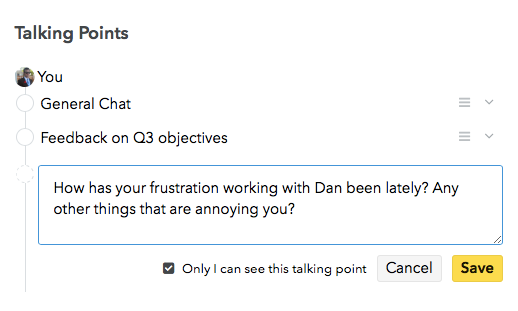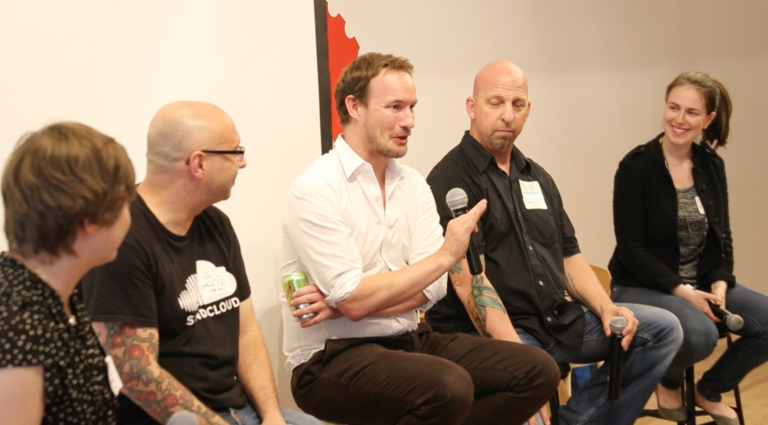
1:1 Meetings: Not just operational
When using Small Improvements for your regular 1:1 meetings, our hope is that the functionality streamlines your ability to formulate a game plan for regular check-ins.
Table of Contents
Capturing important touch points in the shared talking points and meeting notes can also be a powerful resource when it comes performance review time. We highly recommend looking back on your running log of meetings as a another resource available to deepen your perspective on your team’s growth.
There is, however, one potential drawback a tool like ours carries though, and we feel it is really important to always be aware of it:
The structure of our 1:1 meeting hub implicitly suggests the meetings are operational.
When in fact, 1:1s should always incorporate feedback, maybe some venting, and occasionally even non-work conversations.
Below, we go into a little more detail.
Outside of Operational
As mentioned above, the clickable talking points suggest a tactical approach. It can be therefore tempting to focus solely on a list of todos that must be checked through week over week. But we recommend always leaving space for the personal:
- How is your report feeling in their role? How are you supporting their long term career goals?
- What does my manager see as a priority for our team broadly speaking? Can I just have some time to vent frustrations?
- How was that vacation? I love Paris too! Did you check out Montmartre? (Seriously. Remember, we’re people! We spend a lot of time with each other at work. Having conversations about non-work stuff can be just as important when nurturing a successful collaborative relationship, as getting tasks done.)
All of the above are just a few examples of other areas of focus you can frequently incorporate in your 1:1s.
Breaking through the check-marks
So how can you use our tool but find ways to weave in non-operational discussions? Below are a few ideas you could try, please let us know if you are using other techniques! We’d love to share them.
A standing, general talking point
Consider having your first talking point consistently be something general and inviting.
“How is it going?” or even “General chat” – These are good examples to keep the meeting loose and open for a basic update.
Pressure valve
For Managers specifically- Since directly acknowledging frustrations might not be the most positive spark to a check-in, consider setting yourself a reminder as a private talking point.

And of course: Blowing off steam is a normal part of every hard-working team member’s experience.. But if you as a manager find recurring themes when frustrations are expressed, you should probably be doing something about it.
Consider keeping a running list of gripes within the private notes. Since you can look back through all the threaded notes- When you notice patterns, use that as an opportunity to take action.
Fun. It’s allowed.
One of my reports and I have developed a mosaic of in-jokes. Mostly around memes and Slack emojis we use as shorthand.
For fun, she will occasionally post her first talking point as a highlight of what Chuck Norris is capable of, as it relates to this meme.

It breaks the ice, we have a laugh, and then on to plans for the following week.
Got feedback?
We highly recommend having the last talking point a manager creates, always be: “Feedback for me”. Or something to that effect.
People perhaps might be shy or cautious about being entirely candid with you.. But keep asking. Create a trusting environment for your team to communicate with you, and all will benefit.
You will only grow as a leader of people if you listen to your team. Always keep the door open for feedback, it is crucial for you and your team’s success.
Discover more resources

What’s new this year: Action Items, customizations, and more
It’s been a productive couple of quarters (with more to come!). Here’s a round-up of spring product updates and tips to enhance your performance management process.

A recipe for great managers
Sure, hiring good managers is important. But an org’s internal policies and a culture that supports skillful leadership can also elevate great managers.

10 tips every manager needs to grow
Employee insights are valuable to any company, but only if we act on it. Learn about how you can create effective feedback action plans.

Can an organization be both results-oriented and human-friendly?
HR expert Jason Lauritsen is back to detail how organizations can build an “human-friendly” workplace, even in an age where results and performance are prioritized.

4 manager challenges and how to overcome them
Nobody said managing and leading a team would be easy. In fact, being a good manager is one of the most difficult responsibilities a person can take on. According to Gallup, only about one in 10 people have the talent required to manage. But, why is it so hard?

How to give (and receive) more thoughtful feedback
We as human beings tend to view Feedback as negative. But it’s all a matter of framing. Here are 5 tips on how to give and receive more thoughtful Feedback.